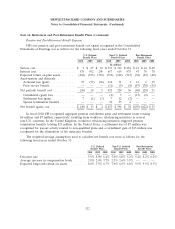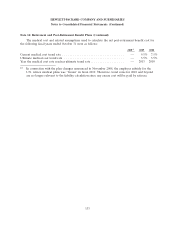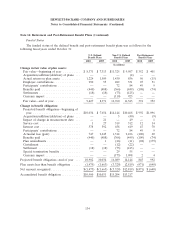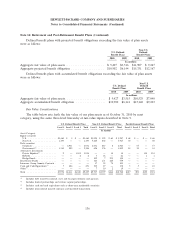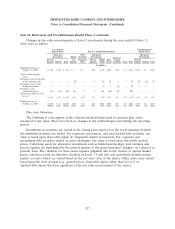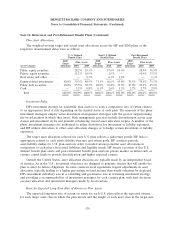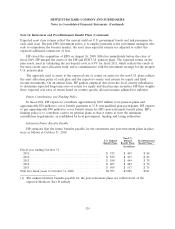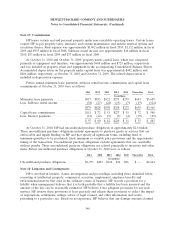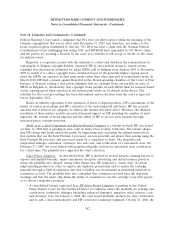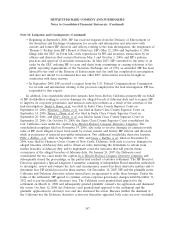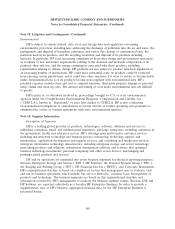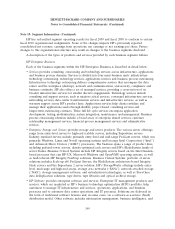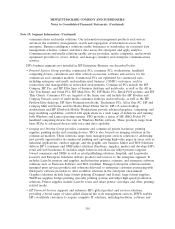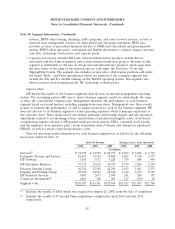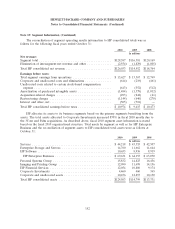HP 2010 Annual Report Download - page 150
Download and view the complete annual report
Please find page 150 of the 2010 HP annual report below. You can navigate through the pages in the report by either clicking on the pages listed below, or by using the keyword search tool below to find specific information within the annual report.
HEWLETT-PACKARD COMPANY AND SUBSIDIARIES
Notes to Consolidated Financial Statements (Continued)
Note 18: Litigation and Contingencies (Continued)
Federal Supreme Court issued a judgment that PCs were not photocopiers within the meaning of the
German copyright law that was in effect until December 31, 2007 and, therefore, not subject to the
levies on photocopiers established by that law. VG Wort has filed a claim with the German Federal
Constitutional Court challenging that ruling. FSC and BITKOM have responded to VG Wort’s claim,
and the parties are awaiting a decision by the court as to whether it will accept or decide on the claim
for judicial review.
Reprobel, a cooperative society with the authority to collect and distribute the remuneration for
reprography to Belgian copyright holders, requested HP by extra-judicial means to amend certain
copyright levy declarations submitted for inkjet MFDs sold in Belgium from January 2005 to December
2009 to enable it to collect copyright levies calculated based on the generally higher copying speed
when the MFDs are operated in draft print mode rather than when operated in normal print mode. In
March 2010, HP filed a lawsuit against Reprobel in the French-speaking chambers of the Court of First
Instance of Brussels seeking a declaratory judgment that no copyright levies are payable on sales of
MFDs in Belgium or, alternatively, that copyright levies payable on such MFDs must be assessed based
on the copying speed when operated in the normal print mode set by default in the device. The
schedule for the court proceedings has been determined, and no decision from the court is expected
before September 2012.
Based on industry opposition to the extension of levies to digital products, HP’s assessments of the
merits of various proceedings and HP’s estimates of the units impacted and levies, HP has accrued
amounts that it believes are adequate to address the matters described above. However, the ultimate
resolution of these matters and the associated financial impact on HP, including the number of units
impacted, the amount of levies imposed and the ability of HP to recover such amounts through
increased prices, remains uncertain.
Skold, et al. v. Intel Corporation and Hewlett-Packard Company is a lawsuit in which HP was joined
on June 14, 2004 that is pending in state court in Santa Clara County, California. The lawsuit alleges
that HP (along with Intel) misled the public by suppressing and concealing the alleged material fact
that systems that use the Intel Pentium 4 processor are less powerful and slower than systems using the
Intel Pentium III processor and processors made by a competitor of Intel. The plaintiffs seek
unspecified damages, restitution, attorneys’ fees and costs, and certification of a nationwide class. On
February 27, 2009, the court denied with prejudice plaintiffs’ motion for nationwide class certification
for a third time. The plaintiffs have appealed the court’s decision.
Inkjet Printer Litigation. As described below, HP is involved in several lawsuits claiming breach of
express and implied warranty, unjust enrichment, deceptive advertising and unfair business practices
where the plaintiffs have alleged, among other things, that HP employed a ‘‘smart chip’’ in certain
inkjet printing products in order to register ink depletion prematurely and to render the cartridge
unusable through a built-in expiration date that is hidden, not documented in marketing materials to
consumers, or both. The plaintiffs have also contended that consumers received false ink depletion
warnings and that the smart chip limits the ability of consumers to use the cartridge to its full capacity
or to choose competitive products.
• A consolidated lawsuit captioned In re HP Inkjet Printer Litigation is pending in the United
States District Court for the Northern District of California where the plaintiffs are seeking class
certification, restitution, damages (including enhanced damages), injunctive relief, interest, costs,
and attorneys’ fees. On January 4, 2008, the court heard plaintiffs’ motions for class certification
and to add a class representative and HP’s motion for summary judgment. On July 25, 2008, the
142


